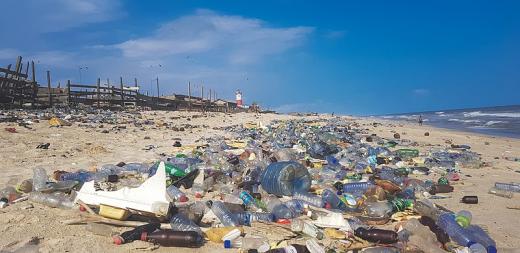
Estrangement in the fulfilment centre:
Anthropocene consciousness and environmental humanities
From a Friday to a Friday our target was to generally destroy 130,000 items a week. I used to gasp. There's no rhyme or reason to what gets destroyed: Dyson fans, Hoovers, the occasional MacBook and iPad; the other day, 20,000 Covid (face) masks still in their wrappers. Staff have just become numb to what they are being asked to do.[1]
As a literature scholar, I often begin a paper or a class with a quotation – a practice that has a long history as a way into textual analysis, exegetical commentary, contemplation or debate. My classes and publications regularly feature quotations from modern German authors and poets. The quotation above is from quite a different source. The speaker is an unnamed employee of an Amazon ‘fulfilment centre’ in Dunfermline, Scotland, detailing the disposal of unsold stock from a warehouse. Once I have gasped myself, I reach for the tools of my discipline: close reading, discourse analysis, literary theory. I begin to wonder if rage and shame are also tools of my discipline.
A text I have read many times with undergraduates, a cornerstone text in the study of literary modernism, is Viktor Shklovsky’s 1917 essay ‘Art as Technique’. It’s this text that gives us the notion of ostranenie, estrangement, the gateway to the Brechtian Verfremdungseffekt or defamiliarization effect; and it’s this text that I reach for as I recoil from the vision of the dumped stock. Shklovsky, against the backdrop (which was never just a backdrop) of the Great War, wrote of the habitualization of perception, the becoming automatic that numbs us to life.
Habitualization devours work, clothes, furniture, one’s wife, and the fear of war. […] And art exists that one may recover the sensation of life; it exists to make one feel things, to make the stone stony.[2]
The anonymous speaker from the Dunfermline warehouse bears witness to the process of habitualization in the Anthropocene. I used to gasp. Reading this testimony, I falter on the past tense. Staff have become numb. The dizzying scale of recursive wastage – the machine of consumer capitalism laying waste even to its own objects – can only be registered retrospectively. This is not a present to which one can bear to be fully present. Unsure which tools might be adequate for the task of what I am being asked to do, I look at the toolbox itself. How might art and literature offer a rhyme or reason to counter this madness? How might the reflective space cultivated by the humanities – a sort of anti-warehouse – allow these rhymes and reasons to unfold their full effects? Turning away from the fulfilment centre, how can I recover the sensation of life?
I look out of my office window. The quiet of campus used to be the quiet of waiting for students to return. I hope it still is that. In Covid times, it’s not even clear whether or when we will return to that space many of us continue to call the classroom. I walk the green spaces of campus – we are fortunate to have ample, lovely ones at this institution – and I wonder what it would take to move the study of literature into them. Some camping stools, good rainwear, good will. The kind of pens whose ink doesn’t smear in that frequent Irish weather called a soft day.
For me, the first thing to do once I stopped being able to ignore the impossible weight of the Anthropocene was to find others who, feeling this weight too, knew ways of talking about how they bear it, how we might share and dislodge it. I’m amazed at the speed with which I have begun to feel at home in a disjointed, emerging, cacophonous, no, polyphonic, shifting, inspiring meta-community of humanities scholars who recognise the stark realities of our context and the stark demands of the future. There is the new ‘Humanities for the Anthropocene’ all-island network, launched virtually on 7 May; there is the UCC Eco-Humanities research group, just formed); another grouping in UCC works on Deep Institutional Innovation across disciplinary boundaries; in the interdisciplinary All Island Climate and Biodiversity Research Network, humanities scholars are beginning to find our voice; the Irish Humanities Alliance has recently established an Environmental Humanities working group; in the UK, I reach out to the Anthropocene Research Group at Newcastle University, and the Centre for Culture and Ecology at Durham University; there are many, many others, in Ireland and internationally.
While we find each other and draw strength and solace from our shared confrontation of reality, much of our work must surely be devoted to looking for a place to land, in Bruno Latour’s phrase.[3] The silver lining of Covid for many of us will be the end of a culture of expectation around hypermobility as the default mode of academic exchange.[4] I ‘went’ (on my computer) to the Pacific Northwest last week, to the launch of another research network, also entitled ‘Humanities for the Anthropocene’. No coincidence, this, but a question of zeitgeist. Some of the participants wept as they told of having lived through the heat dome the previous week: they had gone to the beach to cool down, and found the mussels baking in their shells.
My question after conferences always used to be, what have I learned (or, in careerist mode, got) from this conference? It has shifted subtly, and now borrows from J. Hillis Miller: what should I do after this conference, if anything?[5] Perhaps: go (back?) to that heterotopia of the classroom. Whenever I get in there, or out there (the camping stools are on order to arrive on time for the autumn semester), I wonder what will have changed for me, and for the students. The Anthropocene is a shorthand, and not one that works for everyone. We will make a start by riffing: chthulucene, capitalocene, anthrobscene, necrocene:[6] the age in which life is reckoned as nothing.[7] We will make a screen-free space, and start reading, and feel things.
[1] https://www.itv.com/news/2021-06-21/amazon-destroying-millions-of-items-of-unsold-stock-in-one-of-its-uk-warehouses-every-year-itv-news-investigation-finds
[2] Viktor Shklovsky, ‘Art as Technique’, in Lee T. Lemon and Marion J. Reis (eds), Russian Formalist Criticism: Four Essays. Lincoln: University of Nebraska Press, 1965, pp. 3-24 (p. 12). For an alternative translation, see Viktor Shklovsky, ‘Art as Device’, in Shklovsky, Theory of Prose, trans. Benjamin Sher. Elmwood Park: Dalkey Archive Press, 1991, pp. 1-14 (pp. 5-6).
[3] Bruno Latour, Down to Earth: Politics in the New Climatic Regime, trans. Catherine Porter. Cambridge: Polity Press, 2018, p. 5.
[4] See Emilie Pine, ‘This Is Not On The Exam’, in Pine, Notes to Self: Essays. n.p.: Tramp Press: 2018, pp. 176-181,for an account of the numbing effects of pre-Covid academic hypermobility.
[5] J. Hillis Miller, The Conflagration of Community. Fiction Before and After Auschwitz. Chicago and London: University of Chicago Press, 2011, pp. 181-82.
[6] Donna Haraway, Staying with the Trouble: Making Kin in the Chthulucene. Durham, NC: Duke University Press, 2016; Jason Moore (ed.), Anthropocene or Capitalocene? Nature, History, and the Crisis of Capitalism. Oakland: PM Press, 2016; Bernard Stiegler, The Neganthropocene. London: Open Humanities Press, 2018; John P. Clark, Between Earth and Empire: From the Necrocene to the Beloved Community. Oakland: PM Press, 2019; Kathryn Yussof, A Billion Black Anthropocenes or None. Minneapolis: University of Minnesota Press, 2018; Jussi Parikka: The Anthrobscene. Minneapolis: University of Minnesota Press, 2014.
[7] Shklovsky, ‘Art as Technique’, p. 12.


